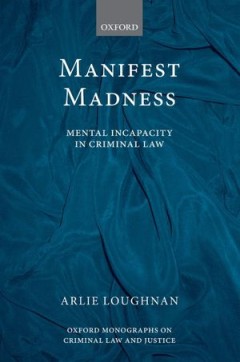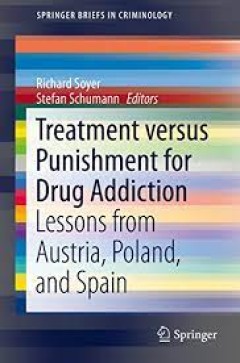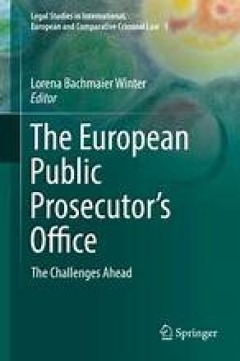Filter by

Sex Discrimination in Uncertain Times
This collection of essays arose from a conference held to mark the silver anniversary of the Australian Sex Discrimination Act (1984). The collection has two aims: first; to honour the contributions of both the spirited individuals who valiantly fought for the enactment of the legislation against the odds, and those who championed the new law once it was passed; secondly, to present a stock-tak…
- Edition
- -
- ISBN/ISSN
- 9781921666773
- Collation
- -
- Series Title
- -
- Call Number
- 362 SEX

Manifest Madness : Mental incapacity in The Criminal Law
Whether it is a question of the age below which a child cannot be held liable for their actions, or the attribution of responsibility to defendants with mental illnesses, mental incapacity is a central concern for legal actors, policy makers, and legislators when it comes to crime and justice. Understanding the terrain of mental incapacity in criminal law is notoriously difficult; it involves t…
- Edition
- -
- ISBN/ISSN
- 9780199698592
- Collation
- -
- Series Title
- -
- Call Number
- 340 LOU m

Power and Prosecution : Challenges and opportunities for international crimin…
This book contains some of the papers that were presented at the first meeting of the newly formed African Expert Study Group on International Criminal Law / Groupe des Experts Africaines en Droit Pénal International held in September 2011 in Brussels, Belgium. The group was established under the auspices of the Multinational Development Policy Dialogue (hereinafter ‘MDPD’) and the Rule of…
- Edition
- -
- ISBN/ISSN
- 9783863950781
- Collation
- -
- Series Title
- -
- Call Number
- 340 POW

Representative Studies on Victimisation : Research Findings from Germany
This paper uses the German official Police Crime Statistics to draw conclusions on the prevalence of crime in Germany, the age dependency of crime, and crime trends in the last few decades. The Police Crime Statistics allow an analysis of crime that is finely divided by types of offence and in some cases reaches far back into the past. This advantage comes with a major handicap: The statistics …
- Edition
- 1
- ISBN/ISSN
- 9783845273679
- Collation
- 308 halaman
- Series Title
- Law / Criminal Law
- Call Number
- 364 BAI r

Toward the Next Generation of Bystander Prevention of Sexual and Relationship…
This briefs integrates and synthesizes an array of research about who helps others and under what conditions and discusses the implications of this research for a bystander intervention focused prevention agenda to reduce sexual and relationship violence in schools and communities. It combines an examination of bystander helping behavior in the specific context of sexual and relationship violen…
- Edition
- 1
- ISBN/ISSN
- 978-3-319-23170-9
- Collation
- XI, 118
- Series Title
- SpringerBriefs in Criminology
- Call Number
- -

Dealing with Uncertainties in Policing Serious Crime
Grappling with uncertainties is at the heart of investigating serious crime. At a time when such crime is becoming more complex and resources are increasingly stretched, this book draws together research and practice perspectives to review fruitful approaches to uncertainties and to chart the way forward. Scene setting chapters describe the consequences of globalisation and the spread of sophis…
- Edition
- -
- ISBN/ISSN
- 9781921666377
- Collation
- -
- Series Title
- -
- Call Number
- 340 DEA

Business and the Risk of Crime in China
The book analyses the results of a large scale victimisation survey that was conducted in 2005-06 with businesses in Hong Kong, Shanghai, Shenzhen and Xi’an. It also provides comprehensive background materials on crime and the criminal justice system in China. The survey, which measured common and non-conventional crime such as fraud, IP theft and corruption, is important because few crime vi…
- Edition
- -
- ISBN/ISSN
- 9781921862540
- Collation
- -
- Series Title
- Asian Studies Series Volume: 3
- Call Number
- 340 BRO b

Trust and Legitimacy in Criminal Justice European Perspectives
The book explores police legitimacy and crime control, with a focus on the European region. Using comparative case studies, the contributions to this timely volume examine the effects of a transition to democracy on policing, public attitudes towards police legitimacy, and the ways in which perceptions of police legitimacy relate to compliance with the law. Following these case studies, the …
- Edition
- -
- ISBN/ISSN
- 978-3-319-09813-5
- Collation
- -
- Series Title
- -
- Call Number
- -

Treatment versus Punishment for Drug Addiction Lessons from Austria, Poland,…
This brief summarizes the results of a two-year, international research project covering drug addiction treatment versus punishment in Austria, Poland, and Spain. It features: -An analysis of the national drug-related legislation and its application in these countries - An evaluation of drug laws and policies by both the law enforcement and drug treatment practitioners -An evaluation o…
- Edition
- -
- ISBN/ISSN
- 978-3-319-18824-9
- Collation
- -
- Series Title
- -
- Call Number
- -

The European Public Prosecutor's Office
This book explores the European Public Prosecutor’s Office (EPPO), the creation of which was approved in the Regulation adopted by the Justice and Home Affairs (JHA) Council on 12 October 2017. The EPPO will be an independent European prosecution office tasked with investigating and prosecuting those crimes defined in the recently adopted Regulation 2017/1371 on combating fraud against th…
- Edition
- 1
- ISBN/ISSN
- 978-3-319-93916-2
- Collation
- XVIII, 279
- Series Title
- Legal Studies in International, European and Comparative Criminal Law
- Call Number
- -
 Computer Science, Information & General Works
Computer Science, Information & General Works  Philosophy & Psychology
Philosophy & Psychology  Religion
Religion  Social Sciences
Social Sciences  Language
Language  Pure Science
Pure Science  Applied Sciences
Applied Sciences  Art & Recreation
Art & Recreation  Literature
Literature  History & Geography
History & Geography